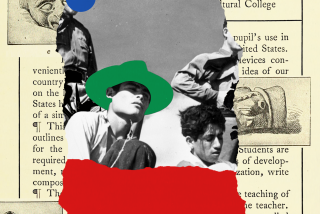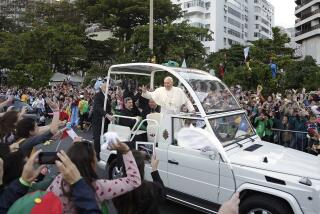Can the Pope Overcome 100 Years of History?
- Share via
WASHINGTON — Pope John Paul II travels to Cuba this week as a peacemaker on the 100th anniversary of the Spanish American War, which “liberated” the island from Spain and turned it, in effect, into a U.S. protectorate. A half century later, Fidel Castro’s nationalist-Marxist revolution seized Cuba. In an extraordinary display of historical irony, the pope’s mission on this anniversary is to help achieve a modicum of peace between Castro’s Cuba and his hate-filled exiled foes in the United States, as well as between Havana and Washington, which have lived in relentless hostility since the 1959 revolution.
The Clinton administration, however, is embarrassed by this papal enterprise and, in a quiet way, most unhappy about it.
The pope defined his self-appointed peacemaking role among Cubans when he told the Vatican diplomatic corps, on Jan. 10, that his trip to Cuba “will give me an opportunity to strengthen not only the courageous Catholics of that country, but also their fellow citizens in their effort to achieve a homeland ever more just and united.” With respect to U.S. policy toward Cuba, the pope has repeatedly denounced as cruel and unnecessary the 36-year economic embargo against the island, as well as other anti-Cuban measures.
The roots of the U.S.-Cuba conflict go back to the 1898 war. Spain lost not only Cuba, but also Puerto Rico, the Philippines and Guam. The huge American triumph marked the birth of U.S. “manifest destiny” and the country’s role as a world power. It was Theodore Roosevelt leading his Rough Riders up San Juan Hill near Santiago, Cuba. It was the sinking of the Spanish fleet by Admiral George Dewey in Manila Bay. A few years later, Roosevelt, as president, set in motion the digging of the Panama Canal, assuring U.S. control of the passage between the Atlantic and the Pacific. Throughout the century, the United States intervened militarily somewhere in Latin America nearly 40 times, including the failed Bay of Pigs invasion of Cuba and armed interventions in Grenada, Panama and Haiti in the last three decades, plus covert involvement in Central American civil wars.
The Philippines was granted independence after World War II. Puerto Rico and Guam are self-governing U.S. territories. But Cuba remains as bewildering a problem as it was when President William McKinley ordered the battleship USS Maine to Havana, ostensibly to protect “American life and property” in Cuba in the face of fighting between Spanish troops and Cuban pro-independence rebels.
Soon after, the Maine was blown up in Havana harbor in an accidental explosion, killing 266 crewmen. But the United States blamed Spain for it--Roosevelt described the sinking of the Maine as “an act of dirty treachery on the part of the Spaniards”--and Washington declared war on Spain on April 23, 1898. Many historians believe that Washington actually welcomed the Maine incident as an excuse for war to prevent the nearly victorious rebels from winning and setting up a truly independent Cuba.
The war ended in October, with the United States installing a miliary government in Cuba, a move that, to this day, symbolizes Cuban bitterness toward America. Though Cuba was awarded formal independence in 1902, its destiny always was controlled from Washington.
The pope hopes to end this bitterness by helping to create a climate favorable for reconciliation between the two countries at the same time as he hopes to bring about a “reconciliation of all the Cubans.”
Despite its noble ambitions, the pope’s peacemaking has created a quandary for Washington. The administration, not incorrectly, perceives the voyage as legitimizing the Cuban leader, thereby undermining its efforts to oust him. It cannot, however, publicly criticize the pope--it would be a political catastrophe for the U.S. world image. So far, it has maintained a studied silence.
Administration officials assume--in this case, not necessarily correctly--that Castro will do nothing to lift political repression at home in return for the pope’s gesture in accepting the invitation to spend four days in Cuba and being televised with the Cuban leader for a global audience. They tend to dismiss as irrelevant in the long run the concessions Castro has already made to the Roman Catholic Church on the island.
Vatican policymakers believe, on the other hand, that Castro has no choice but to start liberalizing Cuba if he wishes to maintain the pope’s support and help convince President Bill Clinton to begin doing away with anti-Cuban sanctions.
The administration is quite aware that the United States will be put in an extremely awkward position, and under mounting international and domestic pressure, if the pope’s peacemaking in the Cuba begins to produce results. There is no question in Havana and the Vatican that the pope’s journey will be the most significant political event in Cuba since Castro seized power 39 years ago.
The question is whether John Paul II can help alter the course of a century of history.
More to Read
Sign up for Essential California
The most important California stories and recommendations in your inbox every morning.
You may occasionally receive promotional content from the Los Angeles Times.










